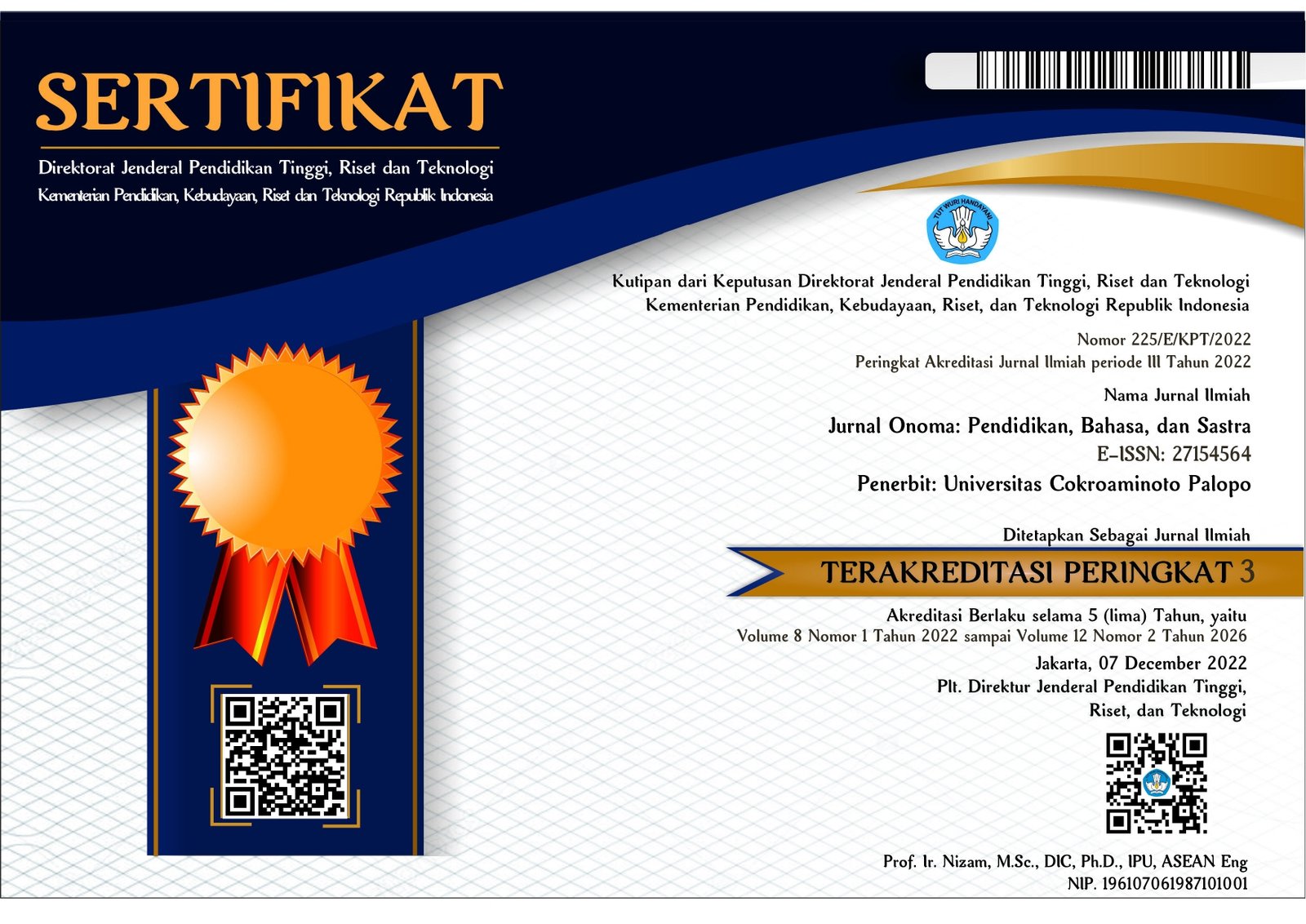Cross-Cultural Pragmatics: An Investigation into Speech Act Realization on The Ship
https://doi.org/10.30605/onoma.v11i1.4492
Keywords:
Cross-Cultural, Pragmatics, Ship, Speech ActAbstract
This study, titled "Cross-Cultural Pragmatics: An Investigation into Speech Act Realization on the Ship," aims to explore the influence of cultural backgrounds on the realization of speech acts among crew members in the Indonesian maritime industry. Specifically, it identifies the patterns and challenges associated with cross-cultural pragmatics on ships. Utilizing a descriptive qualitative design, the research was conducted on KM Lambelu, employing field notes, interviews, and observations as data collection instruments.
The findings reveal that cultural backgrounds significantly influence how speech acts are realized by crew members, particularly regarding politeness, directness, and respect for hierarchy. The study highlights that while cultural diversity enriches interactions among crew members, it can also create communication barriers if not properly managed. The research further emphasizes that politeness strategies are deeply rooted in cultural norms, with a strong emphasis on seniority in hierarchical maritime settings.
Downloads
References
Brown, P., & Levinson, S. C. (2013). Cultural Variations in Request Strategies. Journal of Pragmatics, 45(1), 68-88.
Daniels, Daija M. 2017. Effects of Multicultural Crews on Shipping Safety. Running Header: FLUIDITY OF MULTICULTURAL.
Hartelius, Johanna.(2013). Models of Signification and Pedagogy in J. L. Austin, John Searle, and Jacques Derrida. Taylor and Francis Online Volume 13, 2013 - Issue 1
Lars Klemsdal & Stewart Clegg.(2022). Defining the work situation in the organization theory: bringing Goffman back in, Culture and Organization, Taylor and Francis: United Kingdom 28:6, 471-484.
Miles, M. B., Huberman, A. M., & Saldaña, J. (2014). Qualitative Data Analysis: A Methods Sourcebook (3rd ed.). SAGE Publications.
Roberts, K. H. (2012). Communication Challenges in Maritime Settings. International Journal of Maritime Engineering, 154(4), 345-362.
Smith, J., & Lee, H. (2015). Speech Act Realization in Multicultural Teams. Journal of Intercultural Communication Research, 44(3), 189-208.
Searle, J.R. (1969). Speech Acts: An Essay in the Philosophy of Language. Cambridge University Press
Wu, W. (2010). Intercultural Communication in Maritime Operations. Maritime Studies, 9(2), 145-162.
Yamamoto, M. (2021): Navigating Communication Channels: A Study of Maritime Crew Interaction. Journal of Maritime Communication, 35(2), 189-
208.
Downloads
Published
How to Cite
License
In submitting the manuscript to the journal, the authors certify that:
- They are authorized by their co-authors to enter into these arrangements.
- The work described has not been formally published before, except in the form of an abstract or as part of a published lecture, review, thesis, or overlay journal.
- That it is not under consideration for publication elsewhere,
- That its publication has been approved by all the author(s) and by the responsible authorities – tacitly or explicitly – of the institutes where the work has been carried out.
- They secure the right to reproduce any material that has already been published or copyrighted elsewhere.
- They agree to the following license and copyright agreement.
License and Copyright Agreement
Authors who publish with Onoma Journal: Education, Languages??, and Literature agree to the following terms:
- Authors retain copyright and grant the journal right of first publication with the work simultaneously licensed under Creative Commons Attribution License (CC BY 4.0) that allows others to share the work with an acknowledgment of the work's authorship and initial publication in this journal.
- Authors are able to enter into separate, additional contractual arrangements for the non-exclusive distribution of the journal's published version of the work (e.g., post it to an institutional repository or publish it in a book), with an acknowledgment of its initial publication in this journal.
- Authors are permitted and encouraged to post their work online (e.g., in institutional repositories or on their website) prior to and during the submission process, as it can lead to productive exchanges, as well as earlier and greater citation of published work.

















